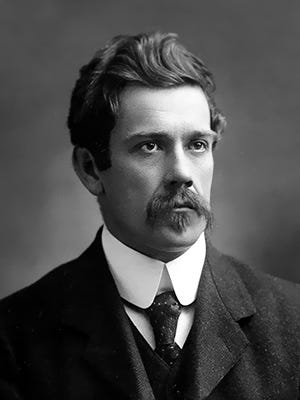John Millington (J.M) Synge (1871 - 1909) was born in Rathfarnham, Dublin in April 1871, into a Church of Ireland family. His father, a barrister died when John was only one and he was educated privately at home before going on to graduate in languages from Trinity College, Dublin. He travelled to Germany and onto Italy before finding himself in Paris, studying languages. It was while in Parish, he met with W.B. Yeats, who convinced him to get to know Ireland and its culture.
Listening to the advice from Yeats, Synge spent much of his time after this on the Aran Islands, off the west coast of Ireland, studying the Irish language and folklore. While on the islands, he took the stories and began to create his works of literature, turning the rhythms of the Irish language, translating the thought/speech patterns into English, giving us the poetic and rhythmic language to his plays.
One of his greatest plays and one I have enjoyed many times since first discovering it as a child, is the 3-act play, “The Playboy of the Western World”. The play was not received well at the time in Ireland when it was first performed in 1907, and when it toured the US. The play takes place in the early years of the twentieth century in County Mayo, Ireland, in the setting of a pub (bar) owned by Michael James Flaherty and has, as its central character Christy Mahon. Christy is a young man from a farm, who tells the patrons at the pub that he has killed his father. Flaherty’s daughter, Pegeen, a barmaid at the establishment, becomes taken with Christy’s story. The play is known for its use of poetic language and Irish dialects.
Synge became one of the leading figures in the Irish Literary Renaissance (late 19th/early 20th century), and along with Yeats, Lady Gregory, George Russell, Edward Martyn, founded the Irish National Theatre Society and the opening of the Abbey Theatre, Dublin in 1904.
Before his death, from Hodgkin’s disease in March 1909, Synge went on to produce six more plays.
“There is no language like the Irish for soothing and quieting” J.M. Synge




